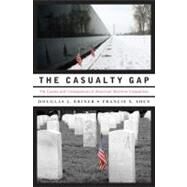The Casualty Gap The Causes and Consequences of American Wartime Inequalities
, by Kriner, Douglas L.; Shen, Francis X.- ISBN: 9780195390964 | 0195390962
- Cover: Hardcover
- Copyright: 4/28/2010
When Americans think about war casualties, they tend to see them simply as "Americans"--undifferentiated by race or class. One effect of this is that Americans tend to be very supportive of U.S. wars, especially since they equate military service with the quintessentially American ideals of equal opportunity and shared sacrifice. However, as Doug Kriner and Francis Chen show in The Casualty Gap , when presented with the incontrovertible fact that American ideals do not reflect reality, and that casualties come disproportionately from poor and disadvantaged communities, support for war drops markedly. An authoritative account of which Americans really bear the burden of combat, The Casualty Gap is the first book to comprehensively examine the divide from War Two to the Iraq war. They demonstrate conclusively that in every war, poorer Americans from remote counties have been overrepresented in casualty rates. Their conclusion is perhaps not surprising. But it demonstrates once and for all what many only suspected--that historically, the American military is not a shining beacon of equal opportunity, but merely replicates larger and enduring social divides. Kriner and Chen also focus on the broader ramifications of their findings. In particular, what does this state of affairs tell us about a core ideal of modern American democracy, equality of opportunity? What sort of impact does it have on civic and political engagement among the most impacted communities? And, if Americans do become more aware of the gap, will they continue to support U.S. wars at the same level they do now?







